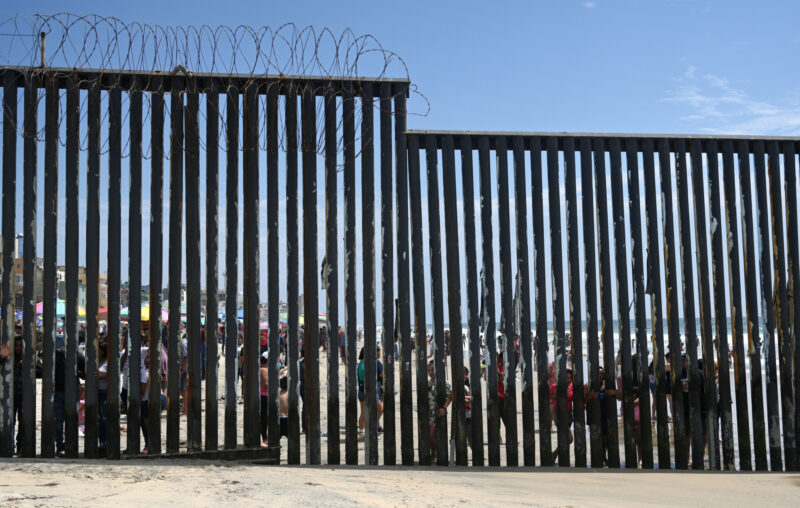


It’s popular within the academy and fashionable intellectual circles to blame rich Westerners for global poverty, or rich Americans for national poverty. Rich people shoulder a lot of the blame for poverty, but not for the reasons you might think.
It’s worth revisiting why rich Westerners share so much blame for poverty. It’s not because we have high standards of living. Rather, it’s because we enthusiastically embrace immigration restrictions that make it hard for people to move to where their labor is most valuable and tariffs that make their labor less valuable by reducing their customer base — and we make ourselves worse off in the process. In October 2023, President Biden announced plans to resume construction on the border wall he’d pledged to stop while running for President. We’re not blameworthy because we’re richer. We’re blameworthy because we refuse to further enrich ourselves by letting foreigners trade.
People blame the wants of the many on the luxuries of the few. This is incorrect, zero-sum thinking, which holds that there is, always and everywhere, only a fixed amount of stuff to go around. By this reasoning, the fact that I have indicates that someone else has not. Someone goes thirsty because I’m drinking a can of club soda or sparkling water. My opulence causes their want. If that’s true, it’s only true in the very, very short run. People don’t have much because they don’t produce much, and while it’s true that we could redistribute everything and raise the poor’s living standards considerably, we could do so only once (and if we did, we would find the same inequalities emerging immediately). Regular confiscations and redistributions don’t exactly provide people with strong incentives to invest and produce a lot in the first place. One person’s wealth does not cause another’s poverty in a commercial society. It’s a bit more complicated when the rich person is a powdered lord getting ever-richer by taxing the peasants.
A related argument blames global capital, suggesting that we owe our high standards of living to the low standards of living of the farmers and factory workers in poor countries. You might periodically see something float across social media explaining how little of the price of a chocolate bar goes to chocolate farmers or claims that you can buy cheap textiles because people around the world make them for you in (by Western standards) horrific conditions. There are alternative, more accurate explanations. First, the chocolate example shows how little of the value added to a chocolate bar comes from chocolate cultivation, rather than the process’s shipping, processing, marketing, and other parts. Second, the poor conditions in “sweatshops” are due to the workers’ low productivity combined with their lousy alternatives. As Paul Heyne has argued, it seems odd (and morally questionable) to suggest that we are obliged to refrain from offering them slightly better alternatives.
A few sentences ago, I wrote that (some) people don’t have much because they don’t produce much. That isn’t because of any innate deficiency. It’s because of the incentives they face in the societies they inhabit. Making people more productive is a laudable goal, but it has a checkered history. The real gains come from people moving to where their labor is more valuable — and that’s in high-income countries like the United States. The problem is, we rich Westerners won’t let them come. We consign them to lives of low productivity and the attendant poverty by building walls and saying, “No foreigners allowed.” The kicker? We impoverish ourselves in the process. We impoverish ourselves by keeping markets from working and, therefore, keeping others poor.
At the end of 2020, I expressed a wish that we would roll back border socialism. Those policies are among the main reasons why people in low-income countries continue to “enjoy” low incomes. If we allowed them to move to the United States, they might remain poor by American standards, but become rich by global standards.
There is another interesting consideration here, as well. Adam Smith famously wrote that the division of labor is limited by the extent of the market. Immigration and trade restrictions deliberately limit the extent of the market. Smaller markets mean less specialization and a coarser division of labor, meaning we’re worse off, on net. Some people might be made better off by such policies (which is why they support them), but their net gains are smaller than the rest of our net losses.
This is especially true in the long run. Larger markets mean a finer division of labor and a finer division of knowledge. In “The Use of Knowledge in Society,” F.A. Hayek quotes Alfred North Whitehead, who said that “civilization advances by extending the number of important operations which we can perform without thinking of them.” Thanks to the division of knowledge, I can write articles like these on a machine I couldn’t design myself, using software I couldn’t write, and I don’t have to think about any of these things. An extensive social division of knowledge means I can concentrate on composition.
In left-wing versions of the popular imagination, rich Westerners are rich because we exploit poor people in the rest of the world. We do share a lot of blame for global poverty, but not because of theft or exploitation. Rather, we are blameworthy because policies like immigration restrictions actively and forcibly prevent people worldwide from improving their lives by moving to where their labor is more productive.





Rubbish.
Ya know how rich people create poverty? By propagating the lie of trickle-down economics. No it does NOT trickle down. Look at that bastard Trump – see anything trickling down there other than the bullshit that the ELITE RICH GUY is the victim? C’mon people, are we really gonna give up that easy? Patriots? Anyone?